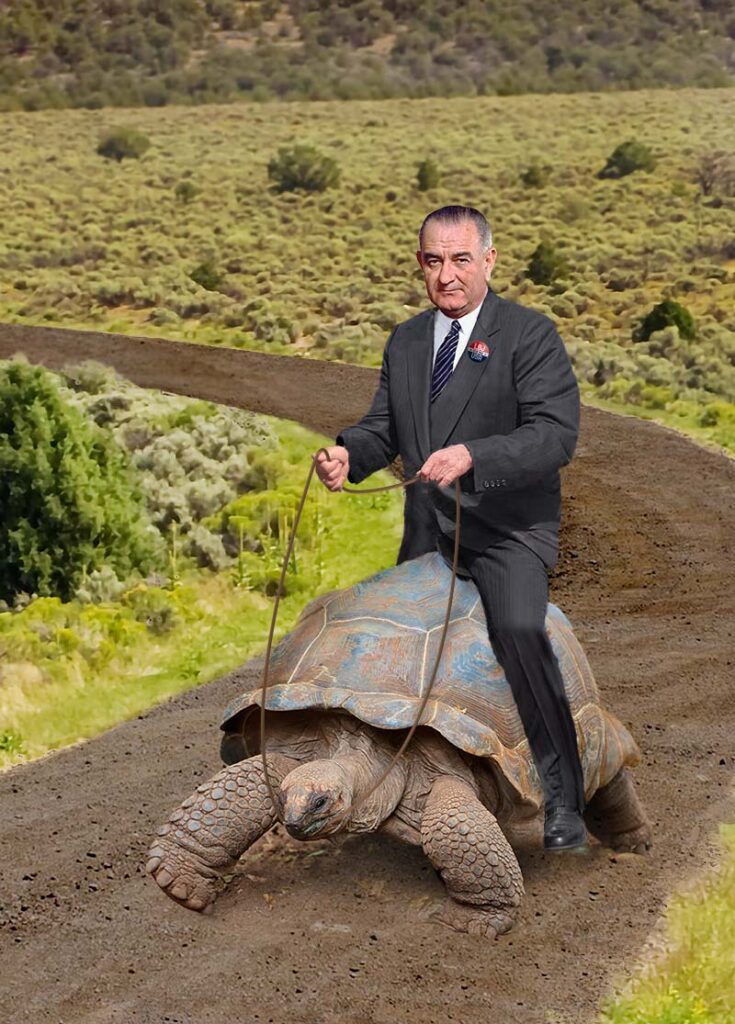During the 1964 presidential campaign season, my father took me to an outdoor event where the Democratic candidate, Lyndon Johnson, was supposed to make a personal appearance. We milled around as various people made speeches, punctuated with announcements that Johnson would be arriving at any time now. I’m not sure that anyone was listening to the speeches; we had come only to see the man himself. After a couple of hours and no sign of Johnson, we drove home, tired and disappointed. This was my first experience of what I suppose would be called a political rally.
I feel bad for the people at the podium. Their job, I assume, was to get the crowd fired up, but their oratory just melded into an indistinguishable drone. Even if LBJ had made an appearance, it’s hard to imagine the spectators becoming a demonstrative mob. I’m guessing that most of the people there, like my father and me, were just normal, suburban Long Islanders who were curious to get a glimpse of a presidential candidate. We already knew that we were voting Democratic (at least those who, unlike me, were old enough to vote), and there was no need to get excited about it.
Ever since then, I’ve wondered about the crowds who we always hear cheering, shouting, and applauding at televised political events. In my experience, backing a candidate in an election is always a matter of choosing the best from an imperfect bunch and crossing your fingers that enough other people will make the same choice. It’s business. I have no more urge to root wildly for a politician than I do for the pumpkin that I select at a Halloween pumpkin patch.
It’s probably worth noting that I have an aversion to having my emotions toyed with. I recently heard Eddie Muller (the acknowledged maven of film noir) say on the Turner Classic Movies channel that he resents it when a movie tries to evoke tears. “Once I realize they’re manipulating me to cry,” he said, “I will not do it.” I would expand that sentiment to any sort of emotional manipulation. Nobody can tell me what to feel and how to express that feeling.
The one time I participated in a political demonstration was in the autumn of 2002, after the US — having already gone to war in Afghanistan — was preparing for an invasion of Iraq, all in retaliation for the September 11 attacks. The idea of responding to violence with more violence was abhorrent to me, and I was moved to attend a peace march in organized by a group called Not In Our Name. I marched silently through the streets of San Francisco, hoping that my physical presence, along with the presence of thousands of other people, would influence our leaders in Washington to rethink their plans. (Spoiler alert: It didn’t.)
Having had no experience with this sort of event, I wasn’t prepared for the whole parade of us to end up gathered in a plaza, listening to overamplified speeches by people expressing their grievances — not only about the impending war, but about the sorry state of the world in general. I don’t know what the point of this was, since our participation in the march should have been evidence that we already felt the same way. Clearly, we were being baited; we were supposed to respond by vocally expressing our righteous anger. For some people, I guess that joining in the call-and-response chants was cathartic; for me, it was a sign that it was time to go home.
My discomfort with this sort of thing goes beyond the political. I’ve always been annoyed when the performers at a large concert delay their entrance until a warmup announcer has prodded the audience into explosive, but artificial, enthusiasm. “Are you ready to have a good time?” the announcer will say. My natural answer would be, “What do you think? Would I have paid this much money — not to mention those outrageous Ticketmaster fees — and come all of this way to be scanned by metal detectors and herded into a densely packed space, if my intention were not to have a good time?” Being a man of few words, I would be willing to condense all of that into a simple “Yes.” But instead, I find that the audience has been conditioned to respond with a roof-rattling cheer.
Of course, that’s not enough for the warmup announcer, whose eardrums have apparently been severely damaged by the effusiveness of previous crowds. “I can’t he-e-a-r you!” he’ll shout.
“I’m sorry about your hearing loss, but take my word for it; I’m definitely ready,” I’m prepared to say. But the rest of the audience responds with an even louder cheer, accompanied by foot stomps and whistles. Not until the sound level reaches a prescribed point on the decibel meter will the announcer deign to let the performance begin.
Let me tell you: I was on stage many times at one point in my life, and I never felt the need to have someone tell the audience how enthusiastically to applaud. I always subscribed to the idea that it’s my job, as the performer, to earn the applause. If the audience response is tepid, I know that it’s not because they’ve been insufficiently manipulated; it means that I haven’t been working hard enough. Even then, if they prefer to sit quietly and think to themselves, “I’m enjoying this,” I have no legitimate reason to object.

Recent Comments